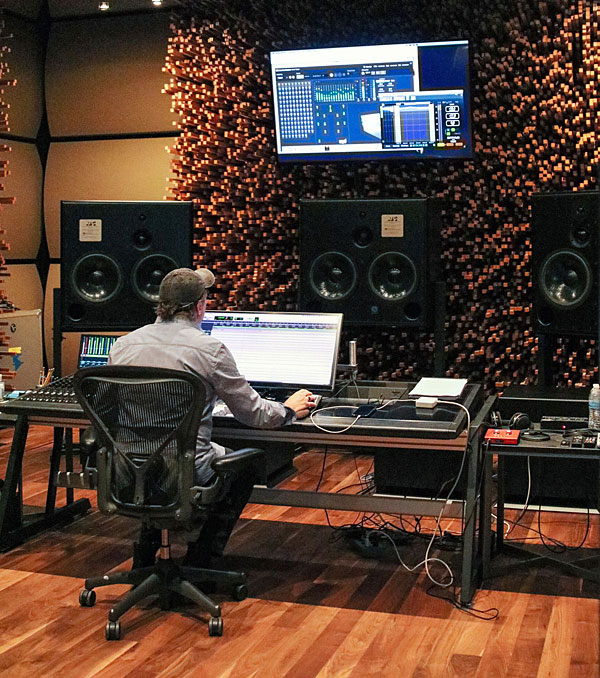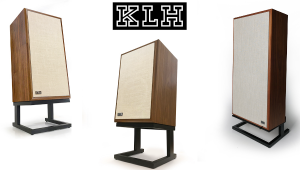Producer Richard Chycki on Mixing The Tragically Hip's Road Apples in Atmos Page 2
Chycki: Great! I appreciate that's something you would say, because that was one of the strongest directives here, as opposed to something like a band that's of a more progressive, experimental nature. This band is a live band, so it was important to ask, "How do we capture a band with a live vibe with something as technologically complex as Atmos? How do we do that without making it sound gimmicky, with all sorts of parts flying around? That's just not gonna match."
Mettler: Right. You're not mixing The Flaming Lips here, where you expect everything to be in a thousand channels, literally. (both chuckle) In The Hip's case, where is that directive coming from—is it from somebody in the band, somebody in their management, or. . . ?
Chycki: Actually, it was my original suggestion of, "This is the goal I feel we need to achieve." And their response was, "Yeah, let's go that way." It was a direction that was enthusiastically accepted. The thing was to capture, and to get, Gord [Downie]'s voice so that it was big, and very present, and very enveloping.
Mettler: Yeah, and that was key for me too as the listener. Both Rob Baker and Gord Sinclair told me they agree with me about this—the best thing I think you did was, while Gord the vocalist is very present, he's not overwhelming the band's performance. Some people might say, "Oh, well, Gord is this 'mythical' artist, so let's put him wayout front there in the mix," but it's not a situation like "Gord plus band." It's everybody in The Hip playing together. While we're hearing Gord being quite present upfront, we're still hearing Rob's lead guitars way off onto the right, depending on what he's playing, and then Paul [Langlois' rhythm guitar] counters over there on the left, Gord [Sinclair's bass] is left-center, and Johnny [Fay's drums are] both front and back. I feel like I'm visualizing that pool table they physically played around in that New Orleans mansion studio, because that's really what you're capturing here in the Atmos mix. You're giving them all the right space to breathe in as they play.

Chycki: That was one of the main goals—to capture the positional nature of the band. In the recording, they had used the mansion as a giant ambient chamber at times, so I had a great template to work from to recreate the mansion—of using the stereo version of the mansion, and enhancing it out into the Atmos type of surround.
Mettler: I really feel like Johnny's drumming was always the unsung hero of "The Luxury," and you really brought that to light in your Atmos mix.
Chycki: Well, thank you. I'm glad you noticed that. Johnny's playing was a preliminary framework for the song, because the breathing within his drumkit is really what sets the stage—at least from a mixing point of view—and then it was a matter of adding in all the instrumentation.
I think your original statement about the band knowing when to stay out of the way of the song and just support it—that's something The Hip have always been well-known for. When there's a song that's just rocking out, a lot of the time, Johnny is just four on the floor, right? He's driving the song, and everybody's driving the song with him. And that's the structure for, when Gord would be singing, nothing is in the way of his lyrics, and nothing is there to distract. It just makes it that much more of a punctuated statement.
Mettler: Yeah. Yeah. I think the interesting counterpart to that is my favorite song on the album. It's one people don't really focus on, but I love "Fight." To me, it's like the opposite of "The Luxury" in the fact that it's like an all-in song where everybody's involved in its multiple movements. One of the things that stood out to me even more in Atmos is every time Gord sings the word "fight," it has a completely different inflection. He never sings that word the same way. The word comes up like 15 or 20 times in the song, and even in the way he punctuates the "t" at the end—some of the time he'll draw out the "t," and then other times, he'll just spit it out. He does it a little bit differently each time. We get that sense of character development with it, because the story of the fight itself evolves over the song. I really feel like you've got all the right elements there to give us this multiple-level piece where there's a lot of stuff going on, including the amazing guitar-soloing Rob [Baker] does. The way everybody tackles their roles on "Fight" makes it feel like there are five stars playing on that song.
Chycki: Well, I just tried to get it so everybody's delivery is kind of maximized there—and it's the overall approach the band had to recording. You can really hear the vibe that was set up by producer Don Smith, and the environment, and the focus they all had on what they were doing. It's something that, when it is spread out in a three-dimensional atmosphere like that, the feeling is amplified, and it becomes even more apparent to listeners.

Mettler: Yeah, I think so too. And speaking of Don Smith, I continue to marvel at his decision to have room mikes placed out in that area where the band was playing, in order to capture the natural ambience of that space in the mansion.
Chycki: Yes, and with this type of mixing approach that has any sort of cross-pollinization of audio, because there are these ambient mikes everywhere, this is stuff you can't really fight. You have to work with it. You have to work with it to maximum benefit, as opposed to, "Hey, I want to try and change this"—no, you can't change it. You have to work with it.
Especially when you have a song like "Fiddler's Green" where it's live off the floor and the vocals are live off the floor too, and it's bleeding all through the acoustic guitars. On the original mix, that's such a strong thing that, when you're doing it in Atmos, you don't want to change it, you know? When I would listen to Gord's voice by itself, it sounded great, but it was a combination of all the mansion ambience bleeding through all the instruments—and then Gord's right up on the mike. It was that combination that really made his whole vocal come to life.
Mettler: Yeah. Yeah. And for Rob, that's the track he often mentions as the one that stops him in his tracks, because he's transported right to that space of where he and Gord had that physical proximity while recording that song, and that level of intimacy comes across better in Atmos. As good as "Fiddler's Green" sounds in stereo—and we're not taking anything away from that two-channel mix, we're just saying the Atmos mix feels more like we're in the room in the New Orleans mansion, sitting there with the guys who are playing the song.
Chycki: It's so satisfying when you get that level of feedback from the artists themselves, like when Rob said, "I've never heard it this way before." Recently, I played back an Atmos mix I had done with the artist who recorded the song in the room listening to it with me. When the song was done, he didn't move for about, I don't know, 10 or 15 seconds. And I was starting to go, "Uh oh, I hope he likes it!"
He finally looked up and he just said, "This is the first time I've ever heard something in my head come through speakers." And for somebody with the depth of a career that he has—for him to say that is such a meaningful expression, from an artist's point of view. If we, from the technology side, are doing that to an artist's material and they can feel that, then I think we're onto a really great symbiotic thing that can be shared with their fans. It's where the artists are saying, "This is what I've been hearing in my head!" This is all the stuff all the artists are saying about Atmos in one way or another: "I've never heard it like this before"—or, like you've been saying, "I feel like I'm there. I feel like I'm going back to when I was in the studio."
From the technical point of view, if we're giving the artists that experience, I think the artists are really enthusiastic about being able to give fans and the listeners the same listening experience. Now they're finally able to say, "This! This is what was in my head at the time—so here, enjoy it!"





























































